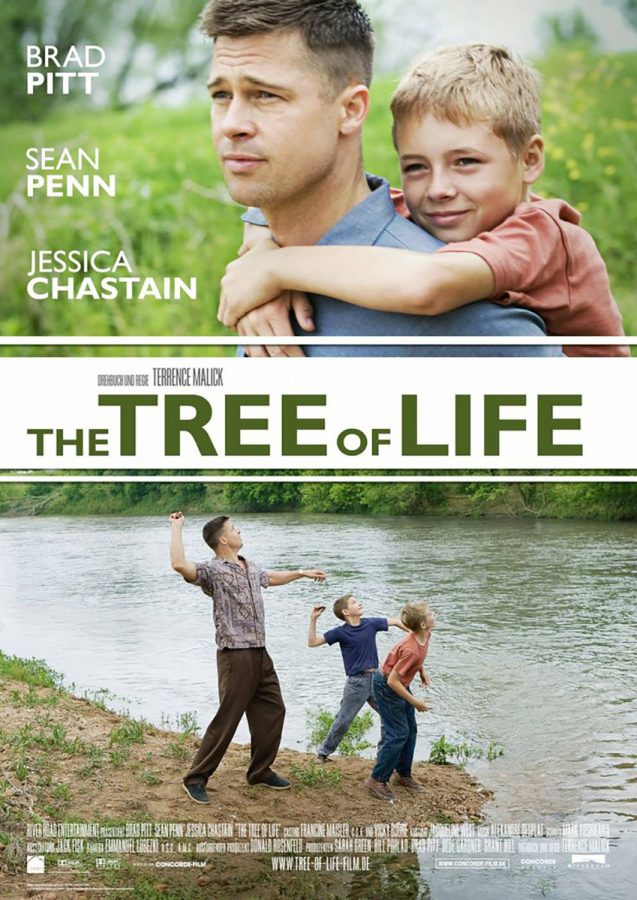‘The Tree of Life’ in review
The interesting, dream-like and somewhat difficult film focuses on an angry father and the projection of his failures onto his family in the 2011 production
Photo by SUBMITTED
The film “The Tree of Life” focuses on one family and their troubles, as well as the concepts of life and death, in an experimental and thought-provoking way.
“The Tree of Life” takes its audience on a crazy, thought-provoking journey. On the surface the film appears to be an unusual montage of meaningless scenes and events, but closer reading reveals a deeper message.
Terrence Malick’s existential and poetic film, “The Tree of Life,” (2011) focuses primarily on the O’Brien family, circa 1956. The family, which consists of a gentle mother (Jessica Chastain), a troubled father (Brad Pitt) and three rambunctious sons, resides in the small town of Waco, Texas. The philosophical film gives focus to the universe, familial relationships and spirituality.
One of the three brothers, Jack, is given the majority of focus throughout the film. While most of the film takes place in Jack’s childhood, the audience also gets a glimpse into Jack’s life as a lost adult (Sean Penn).
Still dealing with the complicated relationship between himself and his father and the tragic loss of one of his brothers, Jack goes into a sort of dream-like, existential spiral filled with flashbacks to his childhood and scenes of what appear to be the creation of the universe, God and the origins of life.
The film shows snapshots of Jack from birth to adulthood and tracks the loss of innocence he endures. He starts as a curious, happy toddler, but soon his general anger and mixed feelings toward his father become evident.
While both parents love their sons, they show this love in drastically different ways. The father is more utilitarian in his parenting, while the mother practices forgiveness. The father, who remains nameless, is oftentimes strict and demanding.
The expectations the father has of his sons are extremely high, and often he is portrayed as a hypocrite. While the sons endure frequent punishment for their inability to please their father, the father himself struggles to fulfill these same expectations. His actions, however, come from a deep love for and pride in his sons.
The mother, on the other hand, attempts to teach her sons how to love wholeheartedly and see all is wonderful in the world. She attempts to cultivate the boys’ curiosity and amazement in the little things experienced every day.
The film’s plot is far from linear and for a solid chunk of the movie there’s no talking whatsoever. It doesn’t tell the succinct, traditional story often expected in a movie. There are constant shifts in time and space, with a plethora of holes in the plot that never really get filled.
In a sporadic manner, the movie goes from the narrow scope of human life on earth, with a focus on the O’Briens and Jack’s life in the modern world, to the vast scope of the universe and origin of life, to the unknowns such as God and the afterlife.
The sporadic movement through time and space is meant to illustrate how miniscule the events of humanity are in the grand scheme of things.
The human experience and the events that make up the lives of individuals feel so large to us but in reality they are mere specks of dust on the immense window that is the rest of the universe. A death of a young boy is just a drop of water in an infinitely large ocean.
There is a lot of whispered narration throughout the film. The majority comes from Jack, both as a child and adult, but the mother and father take over as narrator on a few occasions.
Oftentimes, the narration comprises the characters speaking directly to God, asking him the big question: “Why?”
The film ends and begins on a mystifying and hopeful note, with the glowing light of what appears to be God. By the end of the film, it seems as though Jack is finally able to come to terms with his brother’s death and forgive his father. He enters an afterlife where all of the people who played a major role in his life come together.
If you’re interested in being simultaneously amazed, confused, exhilarated, angered and mystified for the two hours that make up “The Tree of Life,” the film will be showing on campus. Showtimes are as follows: 7 p.m. on Friday, 2 and 7 p.m. Saturday and 2 p.m. on Sunday in the Woodland Theater.

Taylor Reisdorf is a graduate student in the English program who revels in both telling and engaging with compelling stories. This is her seventh semester with The Spectator. She prides herself in her adaptability and desire to continuously experience, learn, and appreciate new things.

